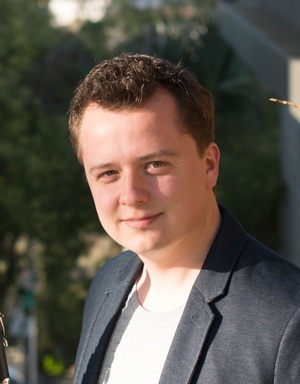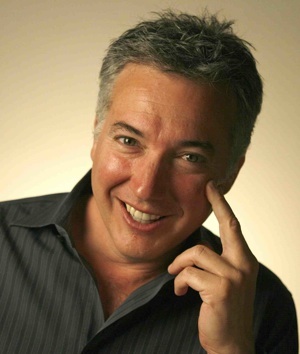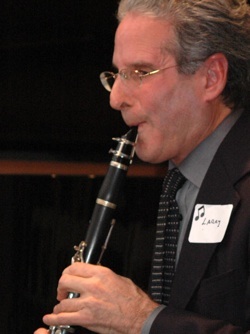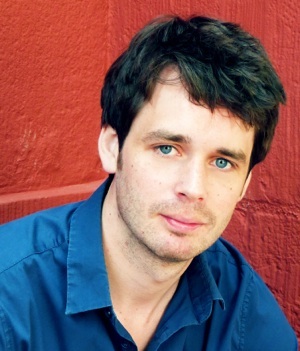
Artists have always had to work at promotion to be recognized, a skill set that comes in handy if they attempt the perilous leap from performer to manager. British-born clarinetist Brenden Guy has slowly been transitioning from clarinetist to publicist to presenter/performer, channeling charm along with the adroit fingering that he displayed at the San Francisco Conservatory of Music on Friday, October 18.
 In a concert of quirky works titled “Curious Flights,” Guy showed a performer’s—and producer’s—agility. One of the highlights of the evening came at the start, with Six Night Sunrise (2010) for violin and piano, written by Dylan Mattingly, a prodigy whose work was recently premiered by the Berkeley Symphony. Violinist Rene Mandel brought depth to the gentle swells of the melody, while pianist Miles Graber added sharp empathy and bright arpeggios.
In a concert of quirky works titled “Curious Flights,” Guy showed a performer’s—and producer’s—agility. One of the highlights of the evening came at the start, with Six Night Sunrise (2010) for violin and piano, written by Dylan Mattingly, a prodigy whose work was recently premiered by the Berkeley Symphony. Violinist Rene Mandel brought depth to the gentle swells of the melody, while pianist Miles Graber added sharp empathy and bright arpeggios.
Mandel, also the Executive Director of the Berkeley Symphony, traded quick fabrics of sound for long-held notes and bent tuning. There were rhythms of breath throughout for a quasi-life that was unexpected and absorbing. They scrubbed their way through an aggressive passage and then quieted down for a pair of last questioning phrases.
Carrying three clarinets—a small E-flat, the usual B-flat and a bass clarinet—Guy took the stage with percussionist Nicholas Reed for Edwin Roxburgh’s Dithyramb I (1972). High sharp notes on clarinet were followed by sharp pings of bells in this exploration of reed and percussion. Then the B-flat clarinet followed, accompanied by low drum rolls, and its motif was later repeated, semi-tuned, by percussion with aspirations of tonality. Finally, large gongs and bass clarinet shared the low end of the sound spectrum. There were wild moments and heavy metallic moments, but despite all of the fun, there was a trade-off of harmony for the diverse timbre of solo instruments.
 However, in the following work we had it all. Larry London’s Suite from Dobashi (1998) was written for clarinet, percussion and violin, and finely realized by Guy, Reed and violinist Tess Varley, with a variety of timbres and rich byplay.
However, in the following work we had it all. Larry London’s Suite from Dobashi (1998) was written for clarinet, percussion and violin, and finely realized by Guy, Reed and violinist Tess Varley, with a variety of timbres and rich byplay.
 Originally intended to accompany a puppet theatre troupe, Dobashi is melodic and light in its approach. Reed performed on a contraption of suspended tin cans that London built, originally semi-tuned, but now, after years of being played, strangely approaching the pentatonic tuning of the Orient. High clarinet and low violin pulsed and twined in child’s play and lover’s spat. It was wonderfully persuasive, evoking the love, racism, and seedy waterfront of the play on which it was based.
Originally intended to accompany a puppet theatre troupe, Dobashi is melodic and light in its approach. Reed performed on a contraption of suspended tin cans that London built, originally semi-tuned, but now, after years of being played, strangely approaching the pentatonic tuning of the Orient. High clarinet and low violin pulsed and twined in child’s play and lover’s spat. It was wonderfully persuasive, evoking the love, racism, and seedy waterfront of the play on which it was based.
After intermission, Reed returned for a solo, Aube (2008), which Roxburgh wrote for this performer. It was a fascinating contrast of metallic slithers and hand-beaten effects, but would also have been effective as a ground for the dance on which it was based.
For a finale, a full orchestra performed Roxburgh’s homage to Edward Lear, a work for orchestra and narrator. This was Roxburgh at his most persuasive, with comical bass clarinet, seasick waves of French horn and mincing violins. In fact, it was filled with such gorgeous textures that the spoken voice was rendered strangely disconcerting.
 For Brenden Guy to actualize a 35-person chamber orchestra is remarkable for a new producer. After a fun inaugural concert last April (featuring the Valinor Winds and Aleron Trio) this was his third and final concert of the 2013 series, and one hopes he will produce—and perform in—many more.
For Brenden Guy to actualize a 35-person chamber orchestra is remarkable for a new producer. After a fun inaugural concert last April (featuring the Valinor Winds and Aleron Trio) this was his third and final concert of the 2013 series, and one hopes he will produce—and perform in—many more.
—Adam Broner
Photos, from top: Brenden Guy, photo by Kristen Loken; violinist Rene Mandel; composer Larry London, photo by Jay Levine; violinist Tess Varley, photo by Johanna Sluser; and percussionist Nicholas Reed, photo by Curious Flights.
